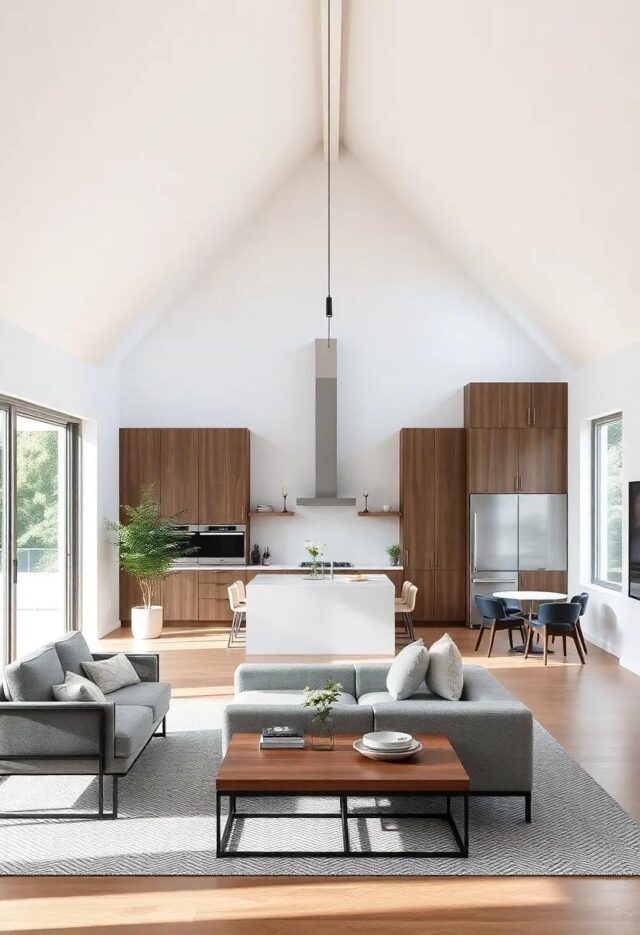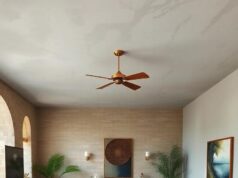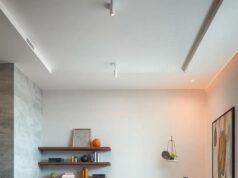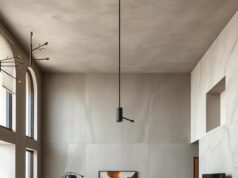Welcome to a world where spaciousness meets creativity! If you’ve ever dreamed of transforming your living space into an airy haven, you’re in the right place. In this listicle, we present to you “.” Whether you’re planning a renovation, seeking design inspiration, or simply looking to refresh your home’s aesthetic, this curated collection is designed to spark your imagination and elevate your space. From clever layout suggestions to bold color palettes and innovative storage solutions, each idea is meticulously crafted to enhance the flow between your living and cooking areas, all while maximizing the grandeur of those stunning vaulted ceilings. Get ready to embrace the beauty of open concept living as you explore these 25 transformative ideas that could redefine your home!
Embrace Natural Light: Maximize windows and skylights to create a bright, airy atmosphere that enhances the open concept space
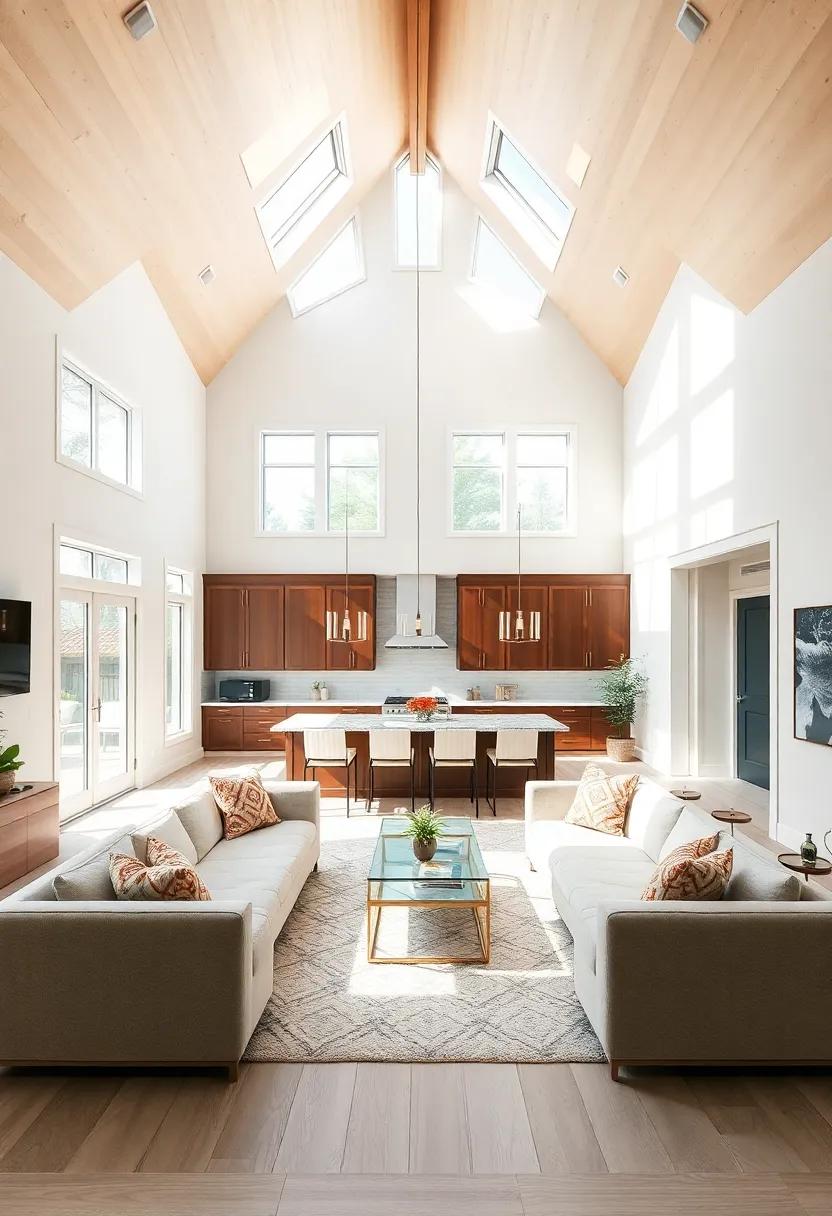
To create a luminous and inviting environment in an open concept living space, consider maximizing the natural light streaming through your windows and skylights. Large, floor-to-ceiling windows not only invite the sun but also provide sweeping views of your outdoor landscape, making your interior feel more expansive.Don’t overlook the placement of mirrors around these windows; strategically positioned, they can reflect sunlight and amplify the airy feel throughout the room. Additionally, opting for sheer window treatments allows for privacy while still basking in natural light, maintaining an unconfined ambiance.
When it comes to skylights, their benefits extend beyond mere illumination; they create a focal point that draws the eye upwards, accentuating your vaulted ceilings. choose operable skylights that can be opened to let fresh air flow in, enhancing comfort while maintaining a connection with the outdoors. To further optimize their effect, consider installing light tubes in darker areas of your home. These tubes channel daylight into spaces that might or else feel cramped or cut off, making the entire area feel fresh and lively. By strategically enhancing your home’s natural lighting, you create a harmonious setting where the living room seamlessly blends with the kitchen, radiating warmth and spaciousness.
Define Zones with Rugs: Use area rugs to visually separate living and kitchen areas while adding warmth and texture to the overall design
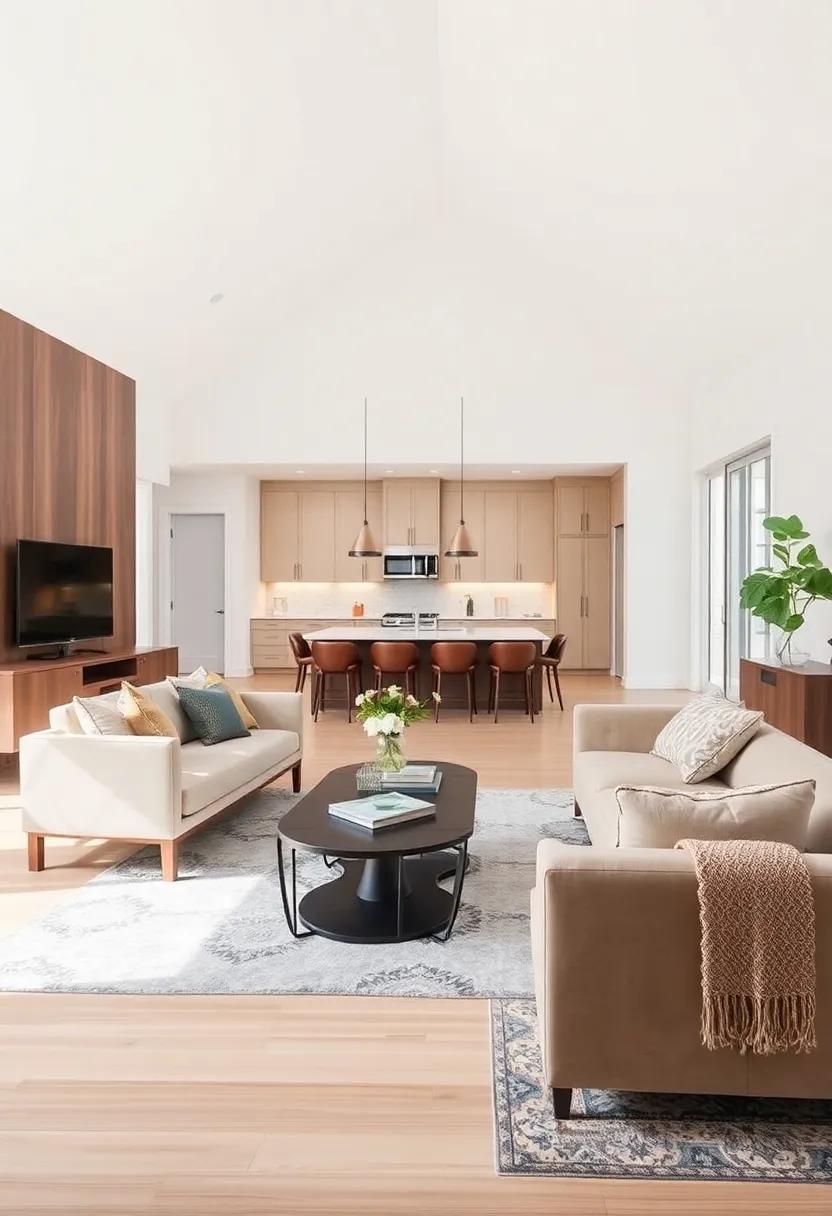
Choosing the right area rugs can be a game changer in an open-concept space. These versatile decor elements not only define different zones but also create a sense of flow between the living and kitchen areas. Consider layering rugs of varying textures and patterns to establish a cozy atmosphere while maintaining visual interest. For example, a plush, shaggy rug can anchor your seating area, while a flat-weave or jute rug can delineate the kitchen space without overwhelming its design.
When selecting area rugs, keep in mind the dimensions and arrangement of your furniture. A well-placed rug can make a small room feel more spacious, while also providing warmth underfoot. Here are key points to remember when styling with area rugs:
- Size Matters: Ensure the rug is large enough to accommodate key pieces of furniture in the area.
- Color Palette: Choose colors that complement the overall color scheme of your room.
- Texture is Key: Layer different textures to add depth and interest.
- Durability: Opt for materials that are easy to clean, especially for rugs placed in the kitchen area.
Use Multi-functional Furniture: Opt for pieces like a storage ottoman or a kitchen island with seating to improve functionality and maintain a cohesive look
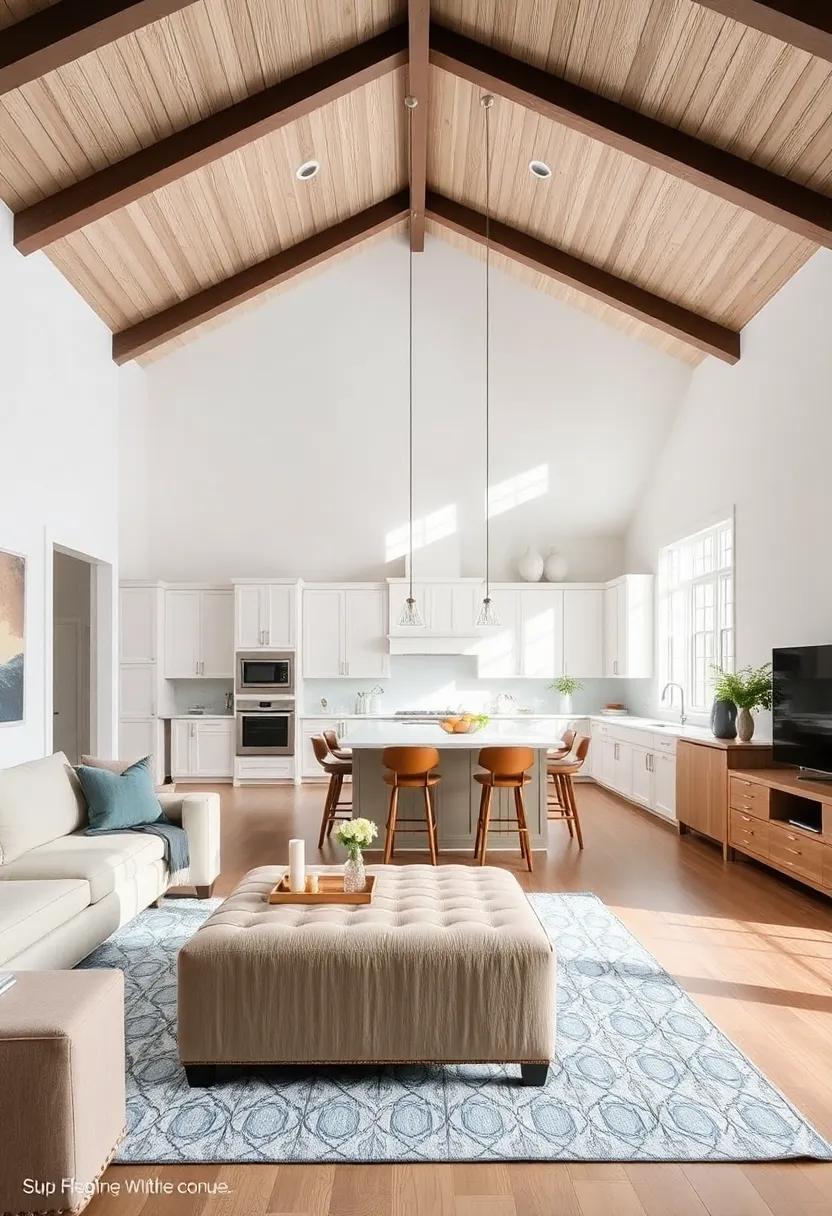
In an open concept living space where every square foot counts, selecting multi-functional furniture can dramatically enhance both utility and aesthetics. Consider a storage ottoman, which not only offers a cozy place to rest your feet but also serves as an elegant storage solution for blankets, books, or games. These versatile pieces come in various styles, colors, and materials, ensuring they seamlessly blend into your design scheme while providing practicality. Similarly, a kitchen island with integrated seating can facilitate dining and conversation, transforming your cooking area into a multifunctional hub without compromising on style.
When choosing your multi-functional pieces,think about furnishings that cater to your specific needs while still maintaining a cohesive look. Here are some inspiring ideas to consider:
- Sofa beds: Perfect for accommodating guests while maximizing space.
- Foldable dining tables: Can easily expand for gatherings or shrink for everyday use.
- Bookshelf room dividers: Utilize vertical space and provide a stylish boundary between the living and cooking areas.
Cohesive Color Palette: Choose a harmonious color scheme that ties both spaces together, creating a seamless transition between the living room and kitchen
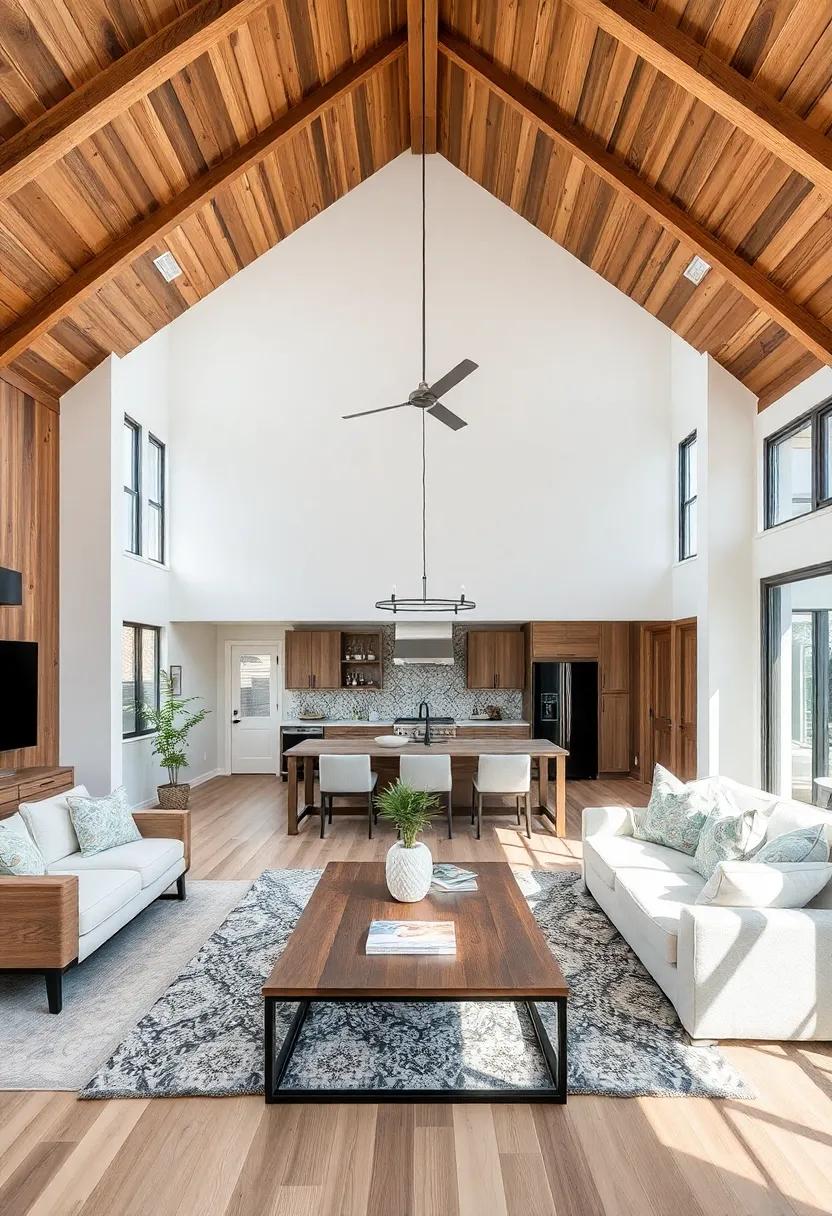
A well-curated color palette can transcend the boundaries between your living room and kitchen, fostering a sense of unity that enhances the overall aesthetic of your open-concept space. To achieve this, consider a selection of colors that complement each other and bring out the best features of both areas. Opt for a mix of neutral tones like beige, grey, or soft white as a base, and then introduce accent colors through decor, furniture, and even appliances. These accents can be drawn from a variety of sources such as your kitchen backsplash or the throw pillows on your couch, ensuring that every hue feels intentional and connected.
When selecting your color scheme, you might explore options like a tranquil blue and green palette reminiscent of coastal retreats or a bold black and gold combination for a more dramatic look. Incorporate these hues through elements such as:
- Wall Colors: Use the same shades on walls in both spaces.
- Cabinetry: Choose kitchen cabinetry that matches your living room furniture.
- Textiles: Select rugs and curtains that tie in your chosen color scheme.
- Accessories: Incorporate vases and artwork in similar hues across both areas.
To visualize your cohesive design, here’s a simple table displaying potential color combinations:
| Base Color | Accent Colors | Features to Highlight |
|---|---|---|
| Soft White | Muted Pastel blues, Sage Green | Cushions, Backsplash, Wall Art |
| Warm Gray | Burnt Orange, Deep Navy | Furniture, Cabinetry, lighting Fixtures |
| Charcoal Black | Gold, deep Rose | Appliances, Decor items, Rugs |
This careful selection and implementation of colors will ensure that your living room smoothly transitions into the kitchen, creating a beautifully coordinated environment that embraces both style and functionality.
Statement Lighting: Install eye-catching light fixtures that serve as focal points while providing adequate illumination for both areas
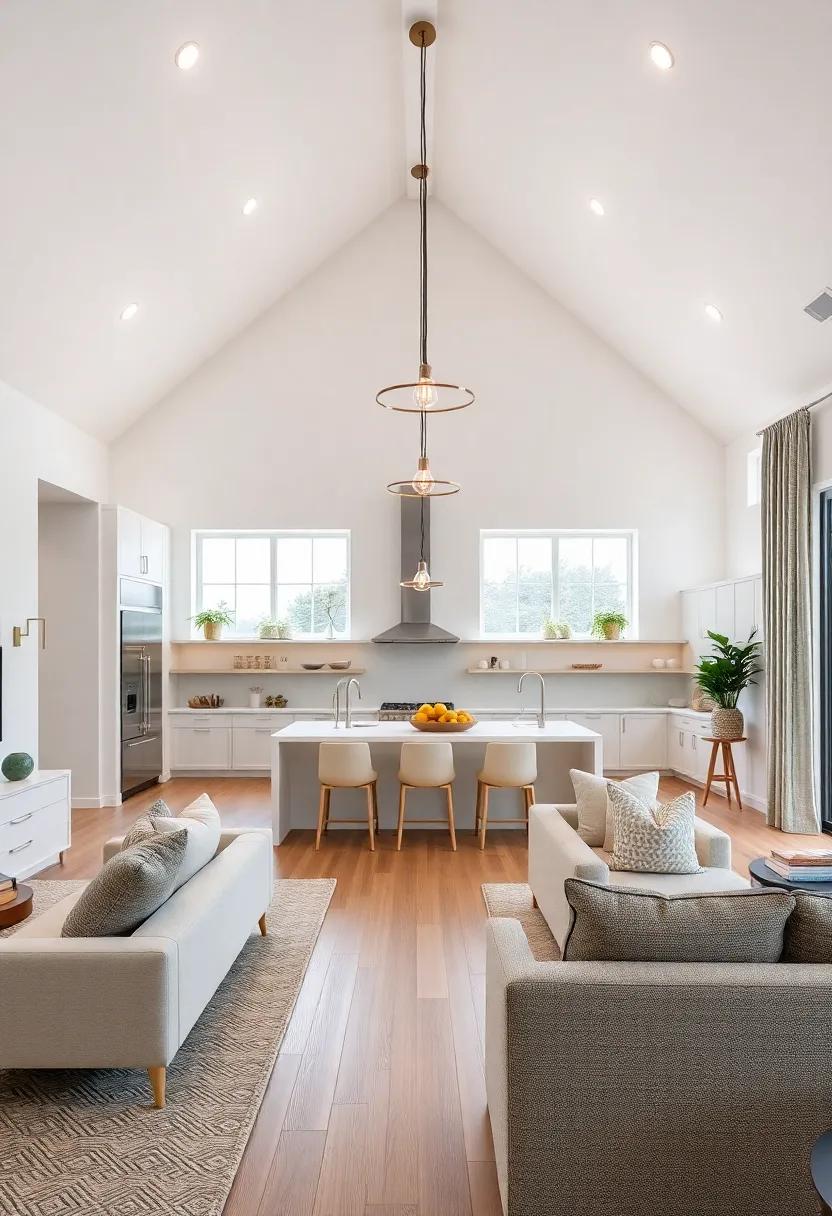
transform your open-concept space into a sanctuary of style and sophistication with bold light fixtures that captivate the eye. Consider installing a chandelier that complements the height of your vaulted ceilings, creating an illusion of grandeur while providing ample light. Popular choices include modern geometric designs or rustic, oversized fittings that make a statement. Pendant lights hung in clusters above an island or dining table can also serve dual purposes, acting as works of art by day and illuminating your space beautifully by night.
For a more layered approach, mix and match different types of lighting sources to enhance the ambiance. Wall sconces can add character to the areas along the kitchen or living room walls, providing soft, indirect light that creates a warm atmosphere. Incorporate a floor lamp with an artistic flair in cozy corners, ensuring you have both functional and aesthetic lighting throughout. With the right fixtures, your open layout can seamlessly merge style and utility, allowing for both lively gatherings and serene moments.
Incorporate Open Shelving: Display decorative dishware or cookbooks on open shelves as a stylish way to connect the kitchen and living space
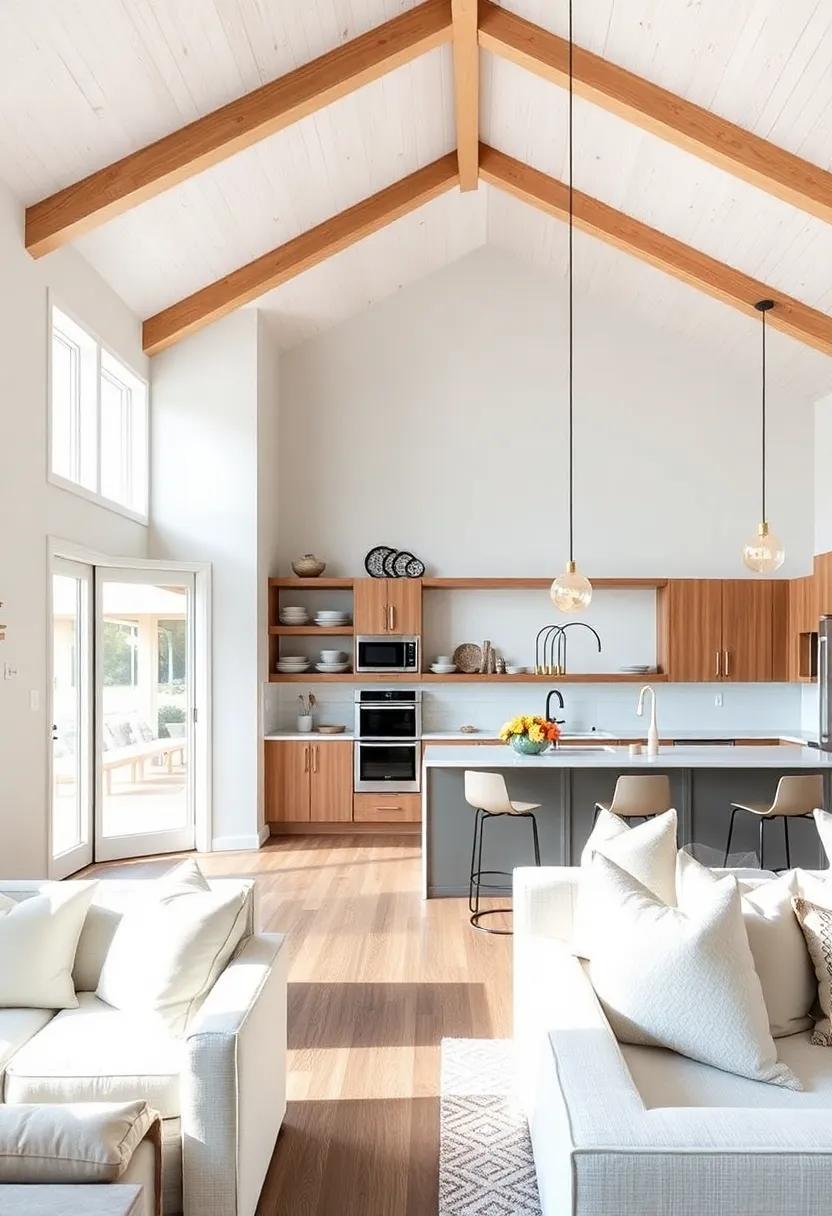
Open shelving brings a refreshing airiness to the kitchen, seamlessly blending it into the living space. By opting for carefully curated shelves, you can transform everyday dishware and cookbooks into artistic displays. Consider choosing a mix of colors, textures, and materials to create a focal point that draws the eye. Such as, stack vintage cookbooks with modern dishware, or pair rustic wood shelves with sleek, contemporary dishes for a dynamic contrast. Artfully arranged ceramics, vibrant glassware, and unique kitchen gadgets can tell a story and display your personality while keeping essentials easily accessible.
To enhance the aesthetic appeal while maintaining functionality, think about integrating lighting directly above or below your open shelves. Under-shelf lighting can highlight decorative pieces, creating an inviting atmosphere that connects with your living area.Use decorative baskets or storage containers on the lower shelves to keep the look tidy and organized,while still allowing for quick access to items when you’re cooking or serving. The key is to balance decorative elements and practicality, mixing your favorite items with a few strategically placed accessories like plants or family photos for an effortless yet cohesive approach.
Play with Height: Use tall cabinetry or vertical artwork to draw the eye upward, emphasizing the beauty of vaulted ceilings
Elevating your open concept living space’s aesthetic can be as simple as introducing elements that draw the eye upward.Tall cabinetry not only provides ample storage but also creates a striking visual impact that complements the height of vaulted ceilings. opt for cabinets that stretch to the ceiling,adorned with sleek hardware or decorative crown molding that highlights their stature. The depth and richness of wood or a fresh white finish can serve as a gorgeous backdrop for your kitchenware, creating an illusion of openness that enhances the overall spaciousness of the room.
Similarly, vertical artwork can transform flat walls into a visually engaging gallery that plays with the room’s height. choose oversized canvases or a collection of framed art that spans from the floor to the ceiling.This method draws attention to the architecture of your space and emphasizes the grandeur of the vaulted ceilings. Consider incorporating a gallery wall with varying frame sizes, allowing for an eclectic yet cohesive look. Additionally, using wall sconces at different heights can accentuate your artwork while providing soft illumination, thus enhancing the ambiance of the open concept layout.
| Element | Description |
|---|---|
| Tall Cabinetry | Increases storage while creating a sense of height |
| Vertical Artwork | Enhances verticality, drawing the eye upward |
| Gallery Wall | Creates a focal point with varied art and frames |
| Wall Sconces | Provides illumination and emphasizes artwork |
Create a Breakfast Nook: Design a cozy corner with built-in seating to facilitate casual dining and enhance the kitchen’s usability
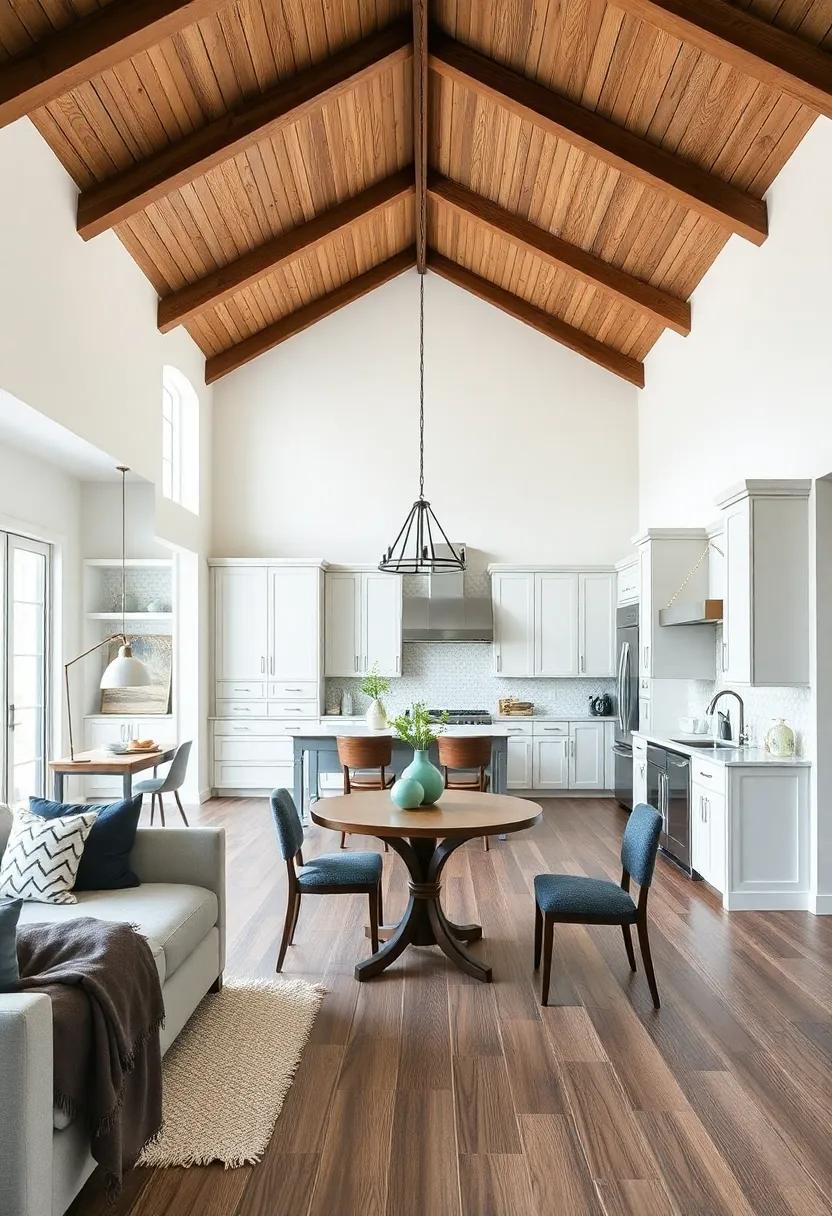
Transform a neglected corner of your kitchen into a delightful breakfast nook that’s perfect for sipping coffee and enjoying casual meals. Consider incorporating built-in seating, which not only saves space but adds a charming architectural element to your open-concept living area. Choose plush cushions and pillows in warm hues or vibrant patterns to create an inviting atmosphere. Add a small round table or even a cozy bench, allowing for intimate gatherings with family or friends. The seamless integration of the nook with your kitchen enhances functionality, making meal prep and dining a delight.
When designing your nook, think about the surrounding décor and lighting. Install floating shelves above the seating area to store your favorite books or display decorative items, enhancing the cozy vibes. Consider using pendant lights or wall sconces to illuminate the space without harsh overhead lighting, creating a soft and welcoming glow. A well-placed ornamental plant can also breathe life into the nook, bringing a touch of nature indoors. This combination of thoughtful design and comfort will not only elevate your kitchen experience but will also add character to your open-concept living space.
Blend Materials: Use a mix of materials, such as wood, metal, and stone, to add depth and interest to your open concept layout
Incorporating a variety of materials into your open concept space can create an engaging visual experience and elevate the overall aesthetic. Consider the harmonious pairing of wood, metal, and stone to establish an enchanting atmosphere. For example, warm wood cabinetry can seamlessly contrast with sleek metal hardware, while a stone backsplash in the kitchen can tie elements together beautifully. By mixing textures, from the natural warmth of reclaimed wood beams in the vaulted ceiling to the cool sophistication of polished stone countertops, you can evoke a sense of balance and dynamic flow throughout the living area.
To guide your material selections, here are some inspiring combinations that can enhance your design:
| Material Combination | Effect |
| Wood & Stone | Adds warmth and earthiness |
| Metal & Glass | Introduces sleek modernity |
| Wood & Metal | Balances rustic charm and industrial edge |
| Stone & Leather | Creates an inviting, luxe feel |
By thoughtfully choosing and blending these materials, you will create not just a room, but an immersive experience that feels both cohesive and eclectic.Play with scale and proportion,ensuring that larger pieces,like a substantial wooden dining table,can coexist beautifully with delicate metal accents,such as light fixtures or decorative objects. This layered approach not only democratizes your design choices but also invites intrigue and conversation in your home.
Add Greenery: Incorporate plants or a vertical garden that brings life to the space and enhances its overall aesthetic
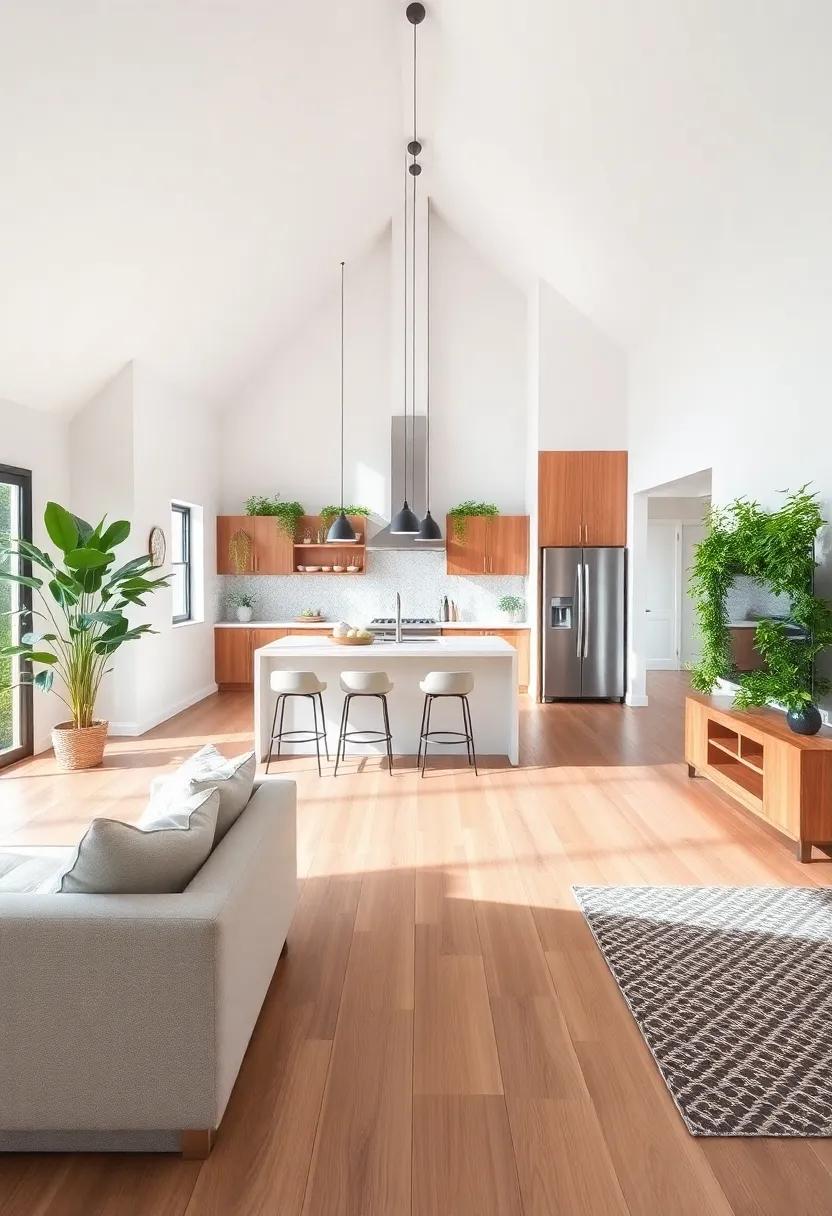
infuse your open concept living space with vitality by incorporating greenery that complements the airy ambiance of your vaulted ceilings. Consider using floor plants such as fiddle leaf figs or snake plants, which not only follow the trend of biophilic design but also improve air quality. For a bolder statement, invest in a vertical garden that transforms a blank wall into a cascading tapestry of green. This lush wall can act as a natural piece of art, enhancing your interior aesthetic while providing a soothing, nature-inspired backdrop.
Opt for a mix of hanging plants and potted varieties to create depth and interest. A few suggestions include:
- Pothos – Known for their trailing vines, they work beautifully in hanging planters.
- Spider plants – Easy to care for and look stunning in macramé hangers.
- Herb garden – Integrate a small herb garden in your kitchen space for both practicality and charm.
Creating a harmonious synergy between your indoor plants and living areas not only elevates the aesthetics but also fosters a calming atmosphere, allowing you to relax and unwind in your beautifully designed home.
Use Color Blocking: Implement bold color accents to delineate the living and kitchen areas while maintaining an inviting flow
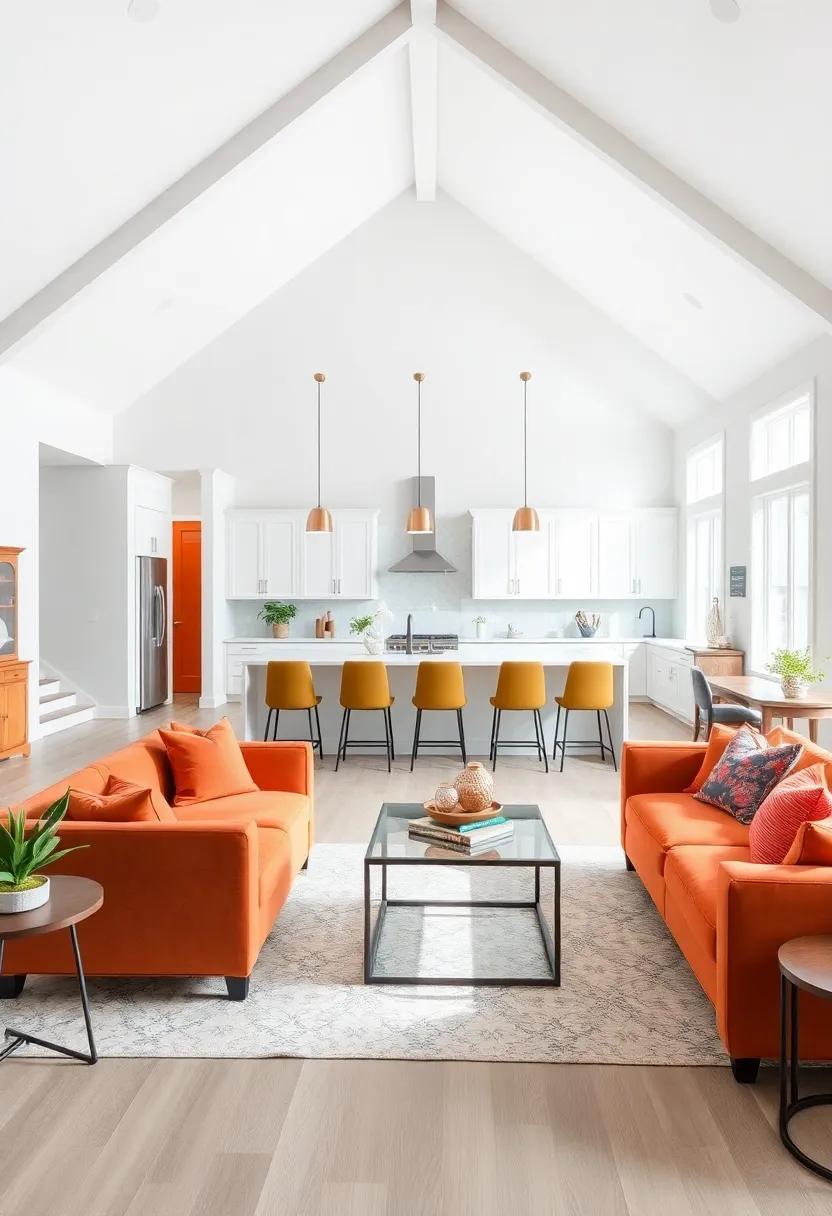
Color blocking can effortlessly transform open concept spaces by creating visual distinctions between the living and kitchen areas. By using bold color accents, you can delineate these zones while still allowing for an inviting flow throughout the space. Consider using deep blues or rich greens in the living area paired with a complementary bright yellow or soft orange in the kitchen. This not only enhances the appeal of each area but also creates a unified ambiance that draws the eye naturally from one space to the other.
To implement this technique effectively,you might explore various elements such as painted accent walls,vibrant area rugs,or colorful artwork that carries the same hues between the two zones. Additionally, furniture choices can play a notable role; opt for sofas or dining chairs in your chosen colors to reinforce the theme. Here’s a simple table to guide your color pairings:
| Living Area Color | Kitchen Area Color |
|---|---|
| Deep Navy Blue | Sunny Yellow |
| Rustic Olive Green | Crisp White |
| Muted Terra Cotta | vibrant Aqua |
| Burgundy | Soft Peach |
Open Up Sight Lines: Arrange furniture to encourage conversation and connection, allowing for clear sight lines throughout the space
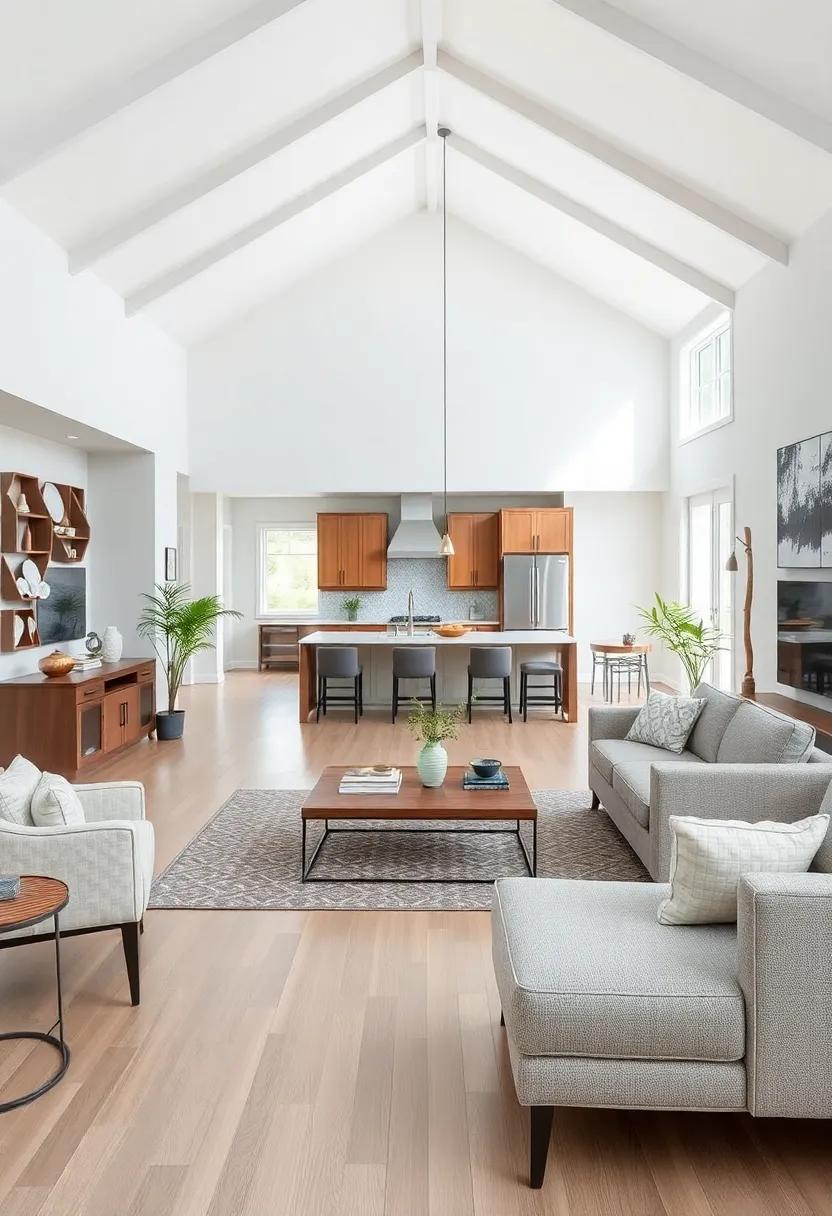
To create an inviting atmosphere within your open concept living room and kitchen, its essential to strategically arrange your furniture for unobstructed sight lines. This encourages natural conversation flow and connection among family and friends. Start by positioning your seating in a circular or semi-circular layout, focusing on a central point like a coffee table or an elegantly designed ottoman. By embracing a layout where everyone can easily see and engage with one another, you transform your space into a social hub. Layers of comfortable cushions and throws can accentuate the cozy nook while maintaining a conversational vibe.
When it comes to tables and other key pieces, consider using low-profile designs that don’t obstruct sight lines.Opt for glass or lightweight materials for coffee tables, allowing light to flow freely and the room to feel more expansive. side tables can be placed close to seating, ensuring drinks and snacks are within reach while keeping pathways clear. Create a sense of cohesion by using complementary colors and textures that unite the living and kitchen areas, making it seamless to traverse between both. this thoughtful arrangement not only enhances the aesthetic appeal but also promotes a sense of warmth and accessibility within your living space.
Create a Focal Point: Establish a central feature, like a fireplace or a large island, that draws attention and anchors the design
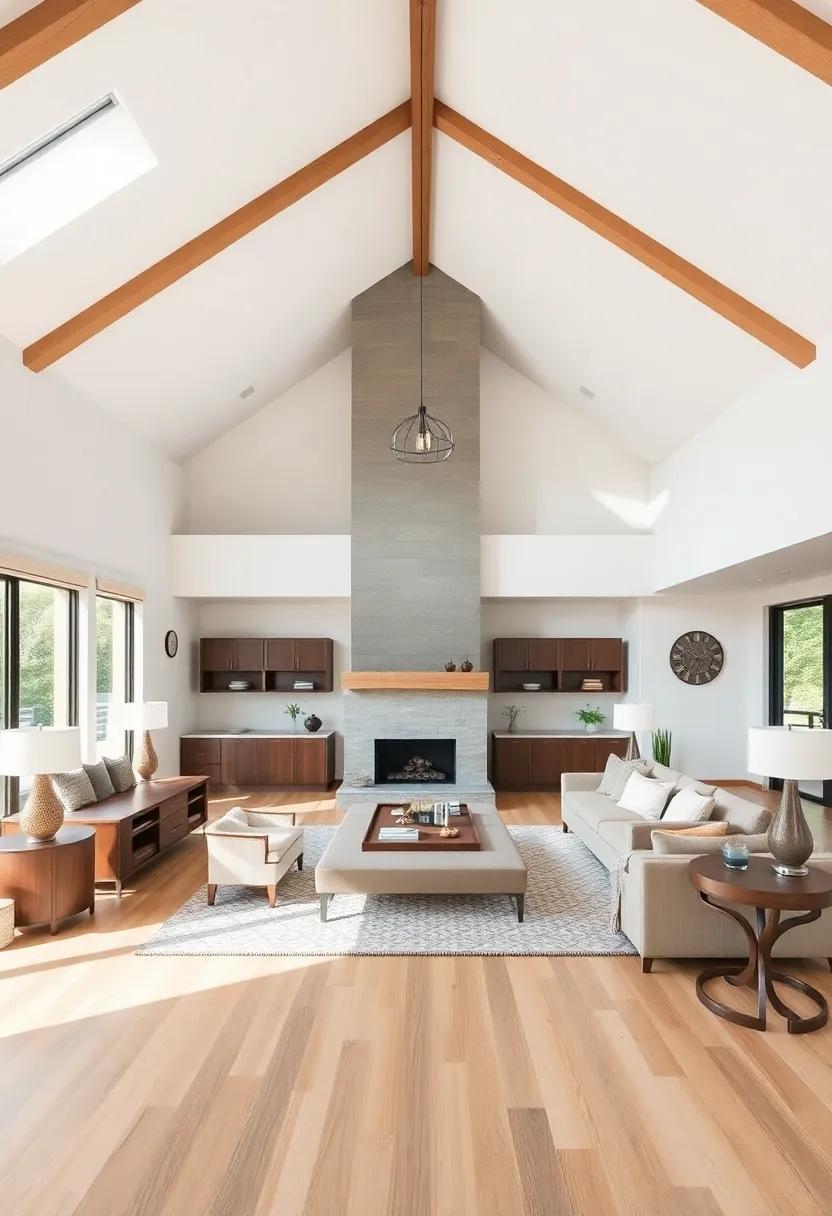
Establishing a central feature in an open concept living space not only enhances its aesthetic appeal but also serves as a functional anchor for the entire design. Consider investing in a striking fireplace that embodies the style of your home—whether it’s a contemporary linear design, a rustic stone setup, or a classic wood-burning model. This centerpiece can foster warmth and intimacy, inviting family and friends to gather around. another excellent focal point could be a large kitchen island, crafted from eye-catching materials like quartz or reclaimed wood.Incorporating features such as built-in seating or pendant lighting above the island can elevate its prominence and create an inviting hub for culinary creativity and social interaction.
When selecting your central feature, it’s important to harmonize with the overall design elements in the space. As a notable example, if you opt for a grand fireplace, consider integrating matching wood accents in the furniture or cabinetry around it to create cohesion. A well-designed island can showcase beautiful bar stools with bold colors or textures that echo the room’s palette, tying the visual narrative together seamlessly. Adding decorative items such as art pieces or stylish vases atop your island or fireplace mantel can further enhance the focal point, infusing the space with personal touches and a sense of balance.
Integrate Technology: Use smart home devices that blend seamlessly into the design, allowing for convenience without disrupting aesthetics
In the modern home, integrating technology can enhance both functionality and aesthetic appeal, especially in open-concept living spaces. consider installing smart lighting systems that not only illuminate your kitchen and living room but can also be tailored to create the perfect ambiance for any occasion.These systems can adjust brightness and color with just a voice command or through a smartphone app, ensuring convenience and style without cluttering your space with unsightly switches and cords.
Equally important are smart speakers and displays that can blend elegantly into your design. Choose models that match your decor, whether sleek and minimalistic or charmingly rustic. These devices can provide entertainment, display recipes while you cook, and even help control other smart devices—all while enhancing the visual flow of your room. Additionally, hidden smart home hubs can be incorporated into cabinetry or design features, maintaining a clean look while centralizing control over your devices.
Personal Touches: Incorporate personal decor items or artwork that reflect your personality and make the space uniquely yours
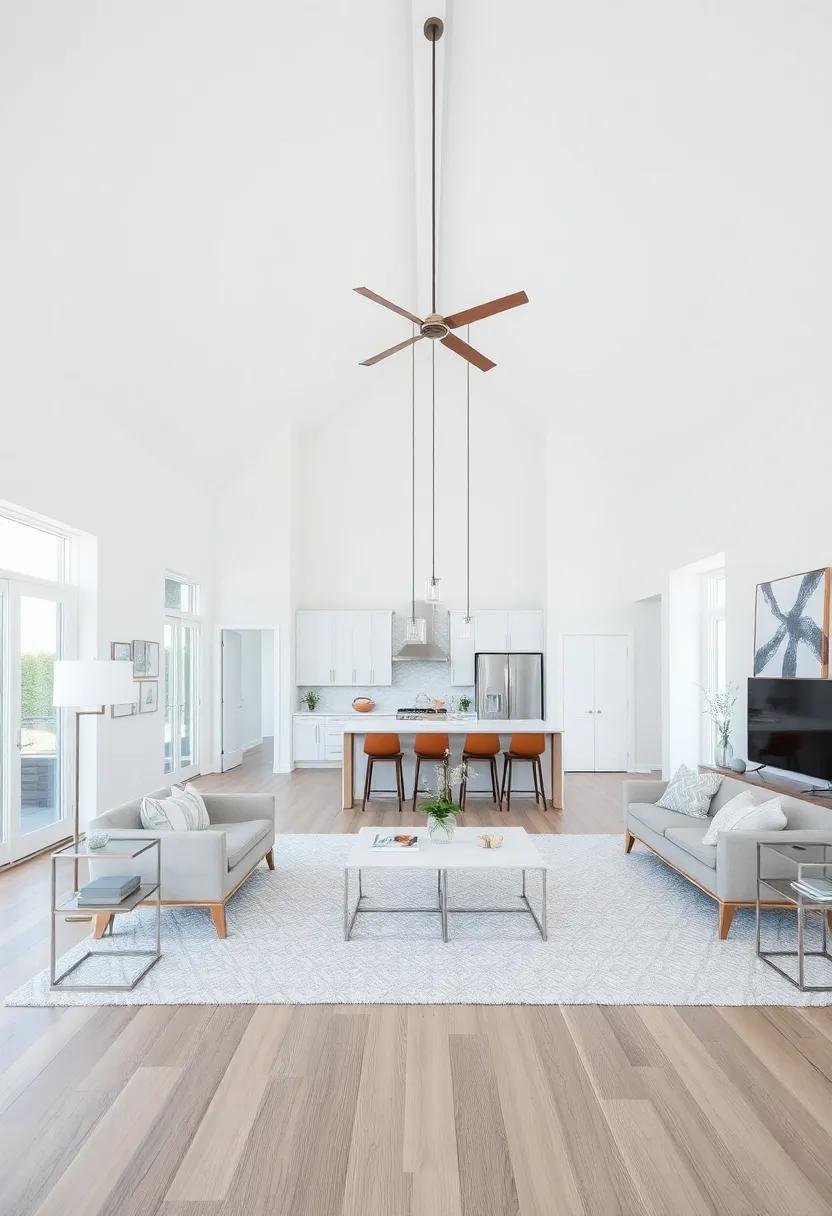
Infusing your open concept living area with personal decor is a surefire way to showcase your individuality and make the space truly yours. Start by curating artwork that resonates with you—perhaps a large canvas piece that reflects your favorite color palette or a gallery wall featuring photographs from your travels. Items like framed quotes or prints from local artists can add depth and character, weaving a narrative of your life’s experiences throughout your home.Consider incorporating personal memorabilia, such as a vintage clock from a family heirloom or quirky souvenir sculptures collected during your journeys, to spark conversations with guests.
In addition to artwork, don’t shy away from integrating your interests through decorative objects. Choose bookshelves filled with your favorite reads, showcasing both literature and personal items like a cherished trophy or a unique globe. Textiles also play a vital role—opt for throw pillows and blankets in patterns and colors that reflect your personality. To go one step further,add a custom table with a design that speaks to your style,whether it’s rustic,modern,or eclectic. By embracing these personal touches, your open concept space will not only be visually stunning but will also serve as a reflection of your unique story.
Consider Architectural Features: Expose beams or add crown molding to accentuate the vaulted ceilings and create visual appeal
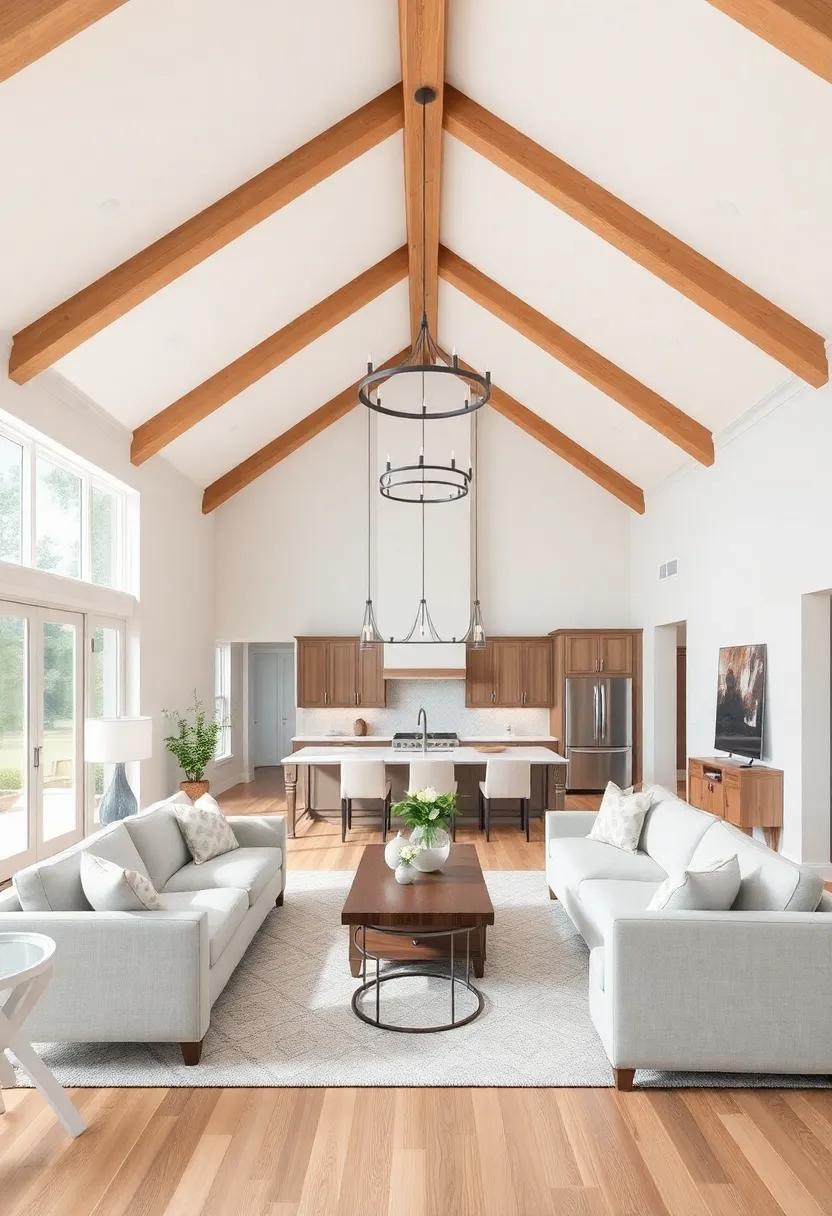
Enhancing the beauty of vaulted ceilings can be achieved through deliberate architectural choices that draw the eye upward. consider exposing the beams of your ceiling, which not only adds an element of rustic charm but also brings warmth and texture to your open concept living space. Exposed beams create a stunning focal point, allowing the elegance of the ceiling to shine through while complementing other elements in your design. Pair them with soft, neutral tones on the walls to amplify the visual impact of the beams.
Another captivating option is to incorporate crown molding, which can elegantly outline the transition between the walls and the ceiling. This timeless feature adds a touch of sophistication, creating an architectural frame that enhances the height of the room. You can choose various styles—from simple and modern to ornate and customary—depending on your design vision.To see the difference that such details can make, refer to the comparison below:
| Feature | Visual Impact | Style Options |
|---|---|---|
| Exposed Beams | Creates a rustic centerpiece | Wood, Metal, Faux Beams |
| Crown Molding | Enhances elegance and height | Simple, Ornate, Modern |
Light and Dark Contrasts: Use contrasting colors between the kitchen and living areas to add drama and interest to the open space
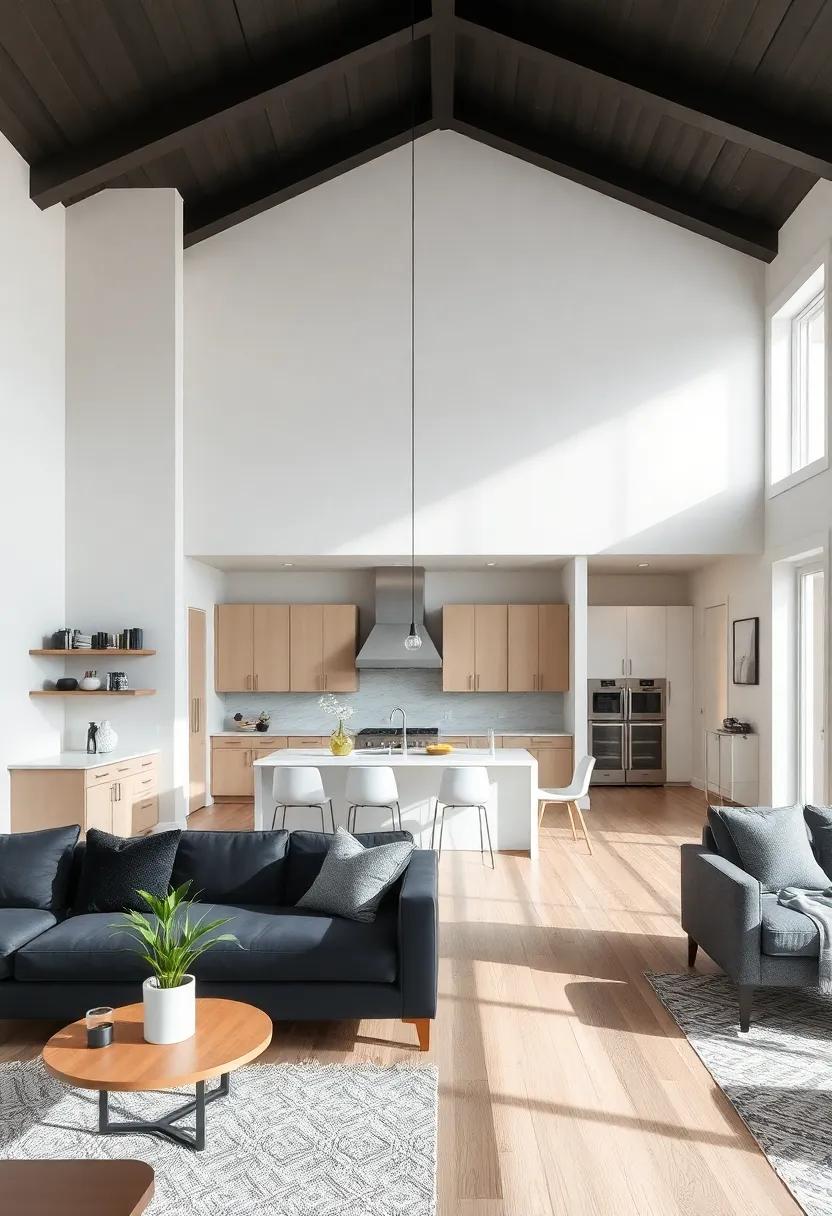
Transforming your open concept space can be as simple as playing with color contrasts to establish distinct zones. Using a bold, dark hue in the kitchen can create a striking focal point against a lighter, airy living area. Consider deep navy, charcoal, or forest green for cabinetry or an accent wall. This not only enhances the visual appeal but also defines each zone while allowing them to remain interconnected. Pair these darker elements with warm, neutral tones in the living area, such as soft beiges or light grays, to balance the space and maintain a cohesive flow.
To maximize the dramatic effect, incorporate textured materials along with your color scheme. Think about pairing matte black fixtures with glossy white countertops or wooden shelves against painted walls. Additionally, lighting can accentuate these contrasts beautifully. Utilize pendant lights over the kitchen island that pop against the darker tones,while softer recessed lighting in the living area keeps the ambiance inviting. Explore these combinations further in the following table:
| kitchen Colors | Living Area Colors | accent Features |
|---|---|---|
| Charcoal | Soft Beige | Pendant lights with brass accents |
| Deep Navy | light Gray | textured wood shelves |
| Forest Green | Warm Cream | Glass-front cabinets |
Create Flow with Biophilic Design: Incorporate natural elements and materials to create a sense of connection to the outdoors
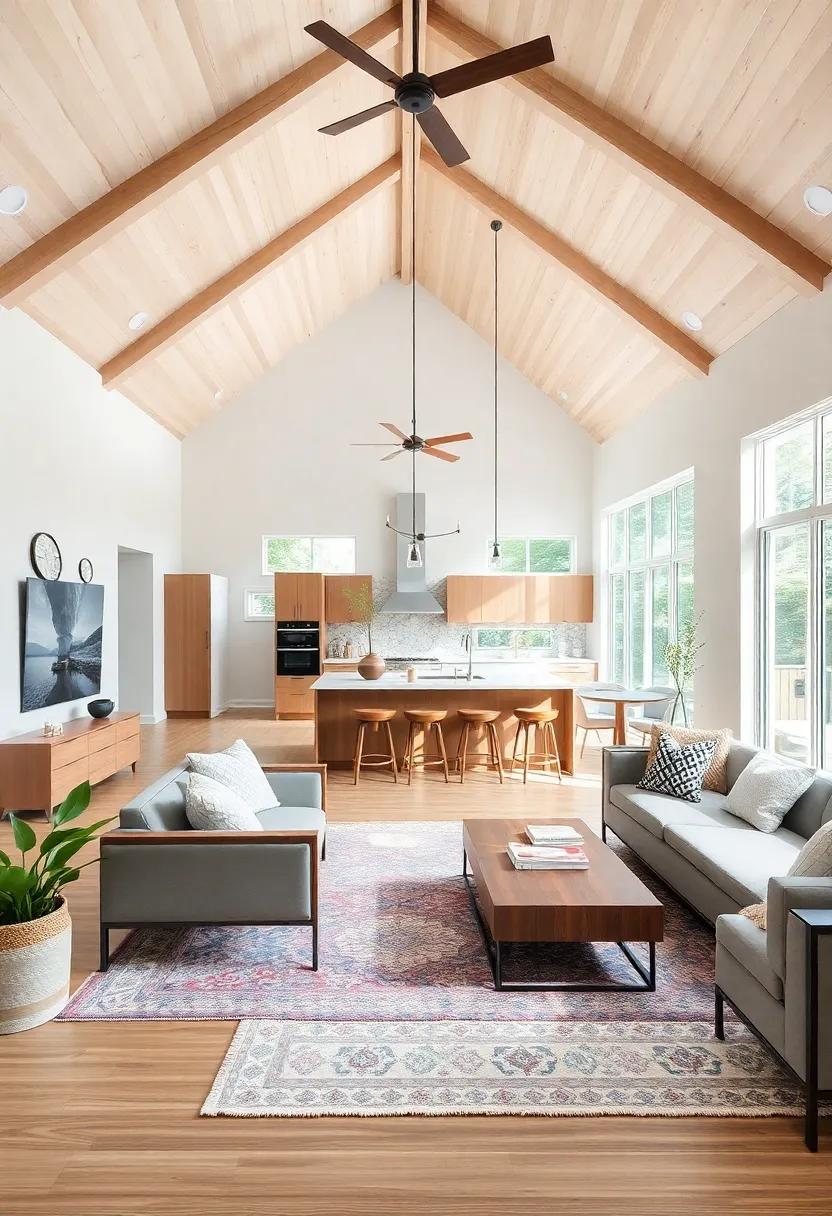
Transform your open concept living space into a serene sanctuary by embracing biophilic design, which emphasizes a profound connection to nature. Imagine seamless transitions between your kitchen and living area, where elements such as large windows flood the space with natural light, creating an inviting atmosphere. To further enhance this connection, consider incorporating natural materials like reclaimed wood for cabinetry or countertops, which add warmth and textural contrast to your design. Accent your space with indoor plants that not only purify the air but also provide vibrant splashes of green, forging a harmonious relationship with the outdoors.
To elevate the flow and harmony of your environment, integrate natural features like living walls or vertical gardens that bring the outdoors inside and act as stunning focal points. Adding textiles made from organic fibers, such as cotton or linen, can help soften the space while echoing nature’s palette. Additionally, consider a color scheme inspired by the natural world; earthy tones can create a soothing backdrop, balanced by more vibrant hues reminiscent of the seasons. With these thoughtful additions, your living area will not only celebrate the beauty of nature but also encourage a sense of calm and well-being.
Use Modular Furniture: Opt for modular sofas or movable kitchen islands that adapt to your needs and enhance flexibility in the space
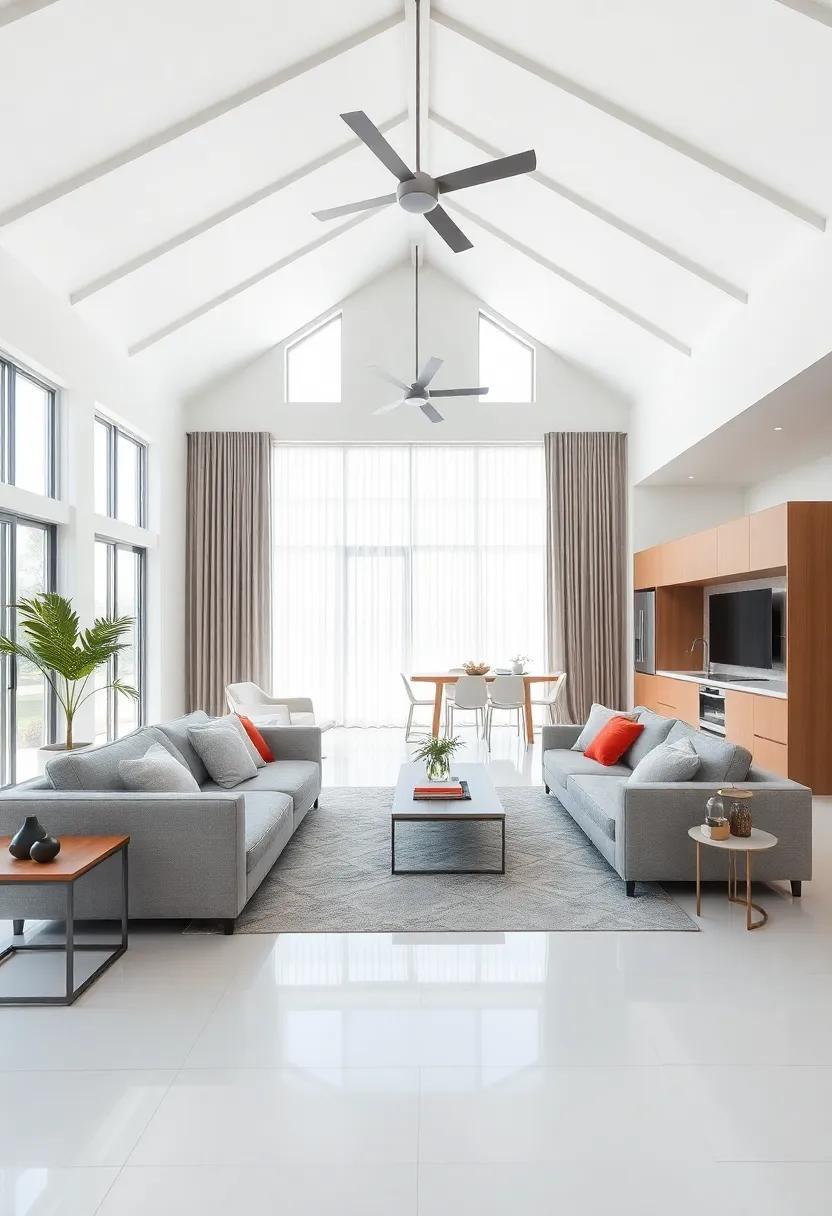
One of the most effective ways to maximize the potential of your open-concept space is by incorporating modular furniture. These pieces provide unparalleled flexibility,allowing you to easily reconfigure your living room and kitchen areas to suit different activities or gatherings. As a notable example, consider a modular sofa that can be rearranged to create a cozy nook for intimate conversations or expanded to accommodate larger groups during game night. This adaptability not only enhances the functionality of your space but also adds an element of visual interest as you shift the arrangement according to your mood or occasion.
In addition to sofas, modular kitchen islands can revolutionize your culinary experience. Opting for a movable kitchen island offers the convenience of additional prep space when needed, yet it can be easily tucked away or repositioned for larger gatherings. You can also combine several pieces of modular furniture to create dynamic zones within your open layout.With clever combinations, such as incorporating stylish stools on one side of the island or adding a foldable dining table, you can seamlessly merge comfort with style while promoting a lively, interactive environment in your home.
Reflective Surfaces: Use mirrors or glass accents to enhance light and create an illusion of more space, emphasizing the openness
Integrating reflective surfaces into your open concept living area can dramatically transform the atmosphere of your space. Mirrors are particularly effective; strategically placing large mirrors on walls opposite windows can maximize natural light and create dynamic reflections that enhance the brightness of the room. Additionally, glass accents, such as tabletops or shelving units, can bring a modern flair while maintaining transparency that allows light to flow freely throughout the area. Consider incorporating a few key pieces:
- Mirrored Furniture: Coffee tables and side tables with mirrored finishes amplify the sense of spaciousness.
- Glass Light Fixtures: use pendant lights made of glass to allow light to pass through,adding elegance without bulk.
- Reflective Wall art: Art pieces that incorporate glass elements or mirrors can serve as focal points and generate a playful interaction with light.
For more subtle enhancements, use decorative wall mirrors to create focal points that draw the eye upward, further accentuating the height of vaulted ceilings. A small gallery wall of framed mirrors in varying shapes and sizes can act as an artistic display while reflecting light from all angles. Additionally, consider using a polished or matte glass backsplash in the kitchen area. This design choice adds a sophisticated touch while capturing and reflecting the beauty of both natural and artificial lighting:
| Type of Reflective Surface | Effect on Space |
|---|---|
| Large Wall Mirrors | Creates an illusion of depth |
| Glass Shelves | maintains an airy feel |
| Mirrored Accents | Adds glamour without visual weight |
Open Plan Dining: Incorporate a dining table within the living space, promoting a communal atmosphere perfect for entertaining
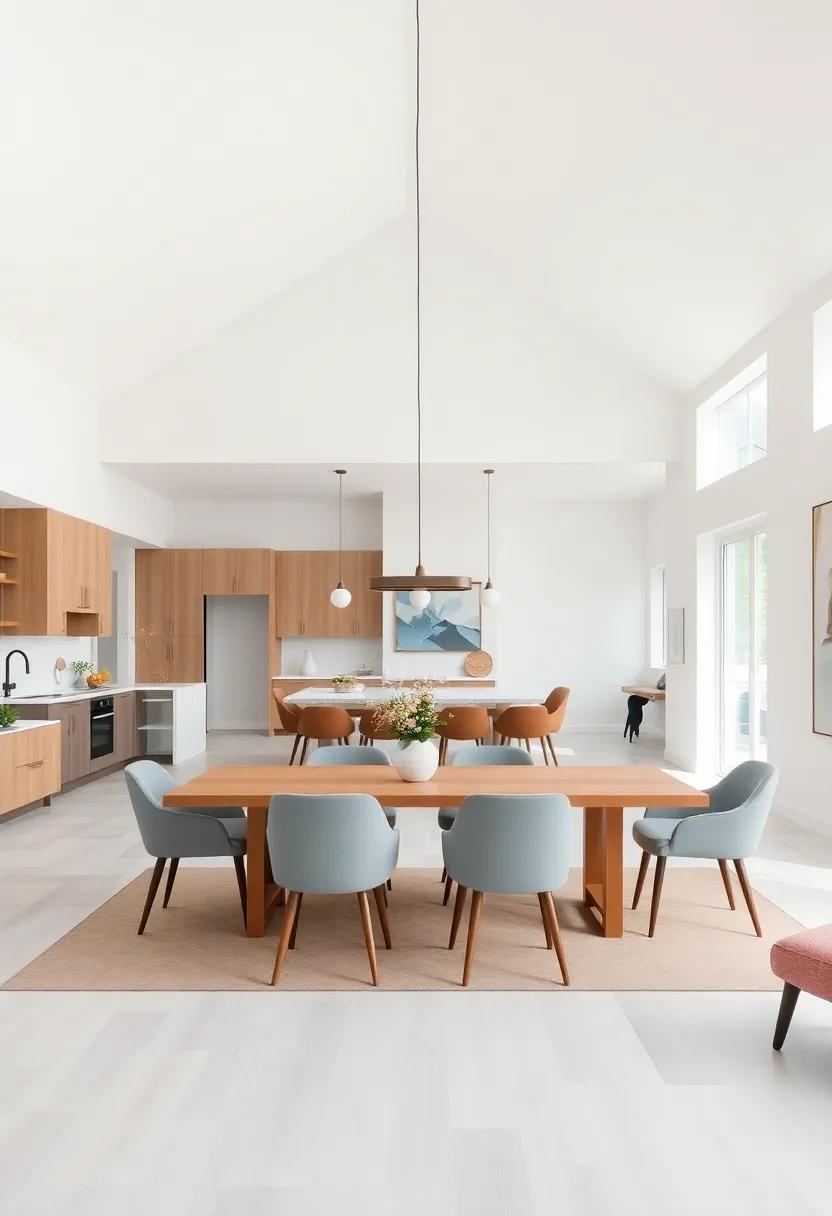
Integrating a dining table within your open living space fosters a welcoming environment that encourages social interaction. Whether you’re entertaining guests or enjoying a casual family meal, a dining area seamlessly blended with the living room enhances the overall experience. Consider round tables that promote inclusivity and conversation, or rectangular designs that can be dressed up with beautiful runners and centerpieces, creating a stunning visual impact. Choose a style that compliments your décor, from sleek modern designs to rustic farmhouse aesthetics, ensuring every meal feels special.
To further enhance the communal atmosphere, think about incorporating multi-functional furniture. Look for tables that can extend for larger gatherings or have integrated storage for easy cleanup. Adorn your dining space with lush plants, vibrant artwork, or soft lighting to create an inviting ambiance. Don’t forget the power of placement; situating your dining table near the kitchen allows for effortless serving and mingling, ensuring everyone feels part of the action. Ultimately, a well-placed dining area within an open layout becomes not just a spot for meals but a hub for memorable moments.
Artistic Backsplashes: Choose bold tile designs or patterns for your kitchen backsplash that serve as a visual bridge to the living area
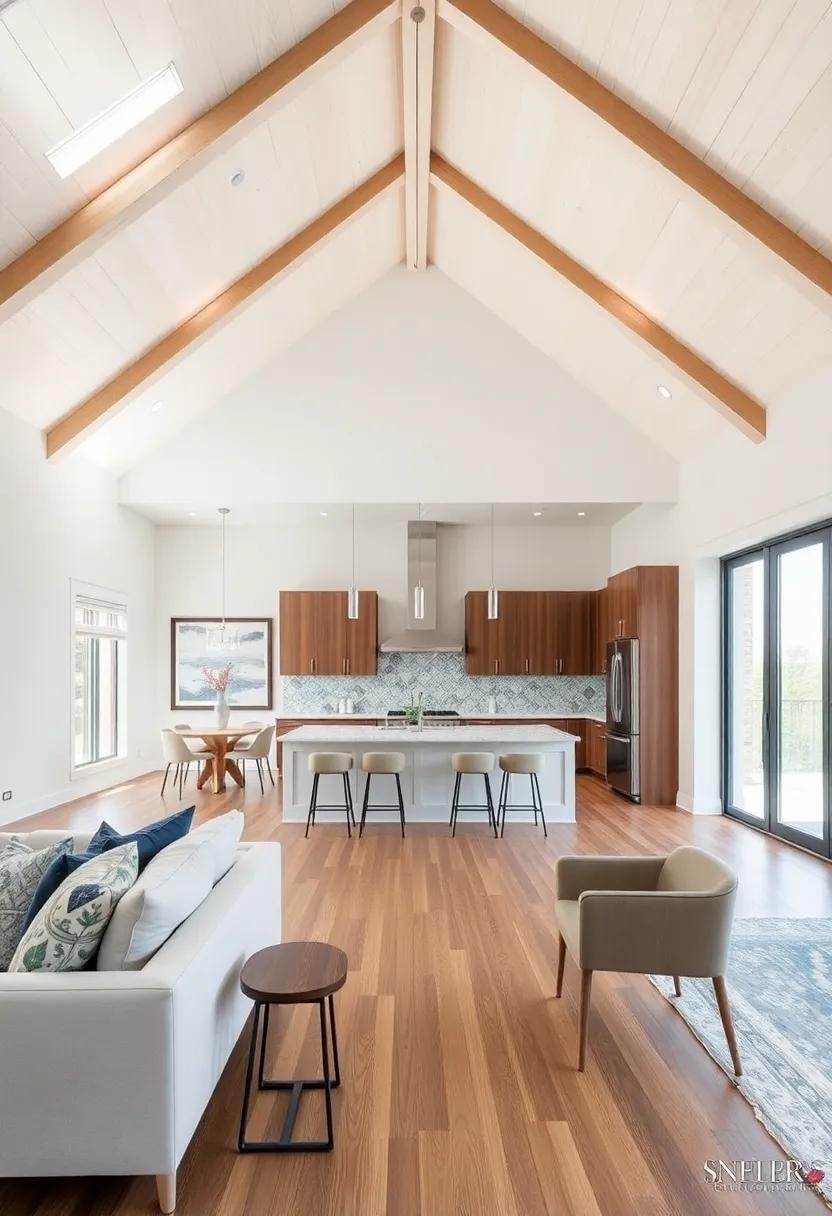
Transform your kitchen into a captivating artistic haven by selecting bold tile designs for your backsplash that seamlessly connect the culinary space with the living area. Consider geometric patterns or vibrant colors that not only catch the eye but also echo the decor and style of your living room. Think about using materials such as Moroccan or encaustic tiles to add depth and visual intrigue. The kitchen can become a conversation piece, bridging the gap between functionality and artistry.
To further enhance this visual connection, choose tile layouts that complement your space, such as:
- Classic Subway Tiles: Classic yet chic, these can be arranged in innovative patterns like herringbone.
- Large Format Tiles: Ideal for a modern look, they create a sleek and uninterrupted surface.
- Graphic Prints: bold designs can act as a focal point, inviting guests into the kitchen.
- Colorful Mosaic: Mixing various hues adds vibrancy and can mirror elements from your living area.
Don’t be afraid to play with texture and dimension. For instance, the use of raised patterns or 3D tiles can introduce new layers, making the backsplash visually stimulating. Moreover, pairing lighter-toned tiles with darker furnishings can create a striking contrast, ensuring your kitchen remains in harmony with the overall design of your open concept living space.
Layer Textures: Use various textures through textiles,finishes,and décor to create a rich and inviting environment in both areas
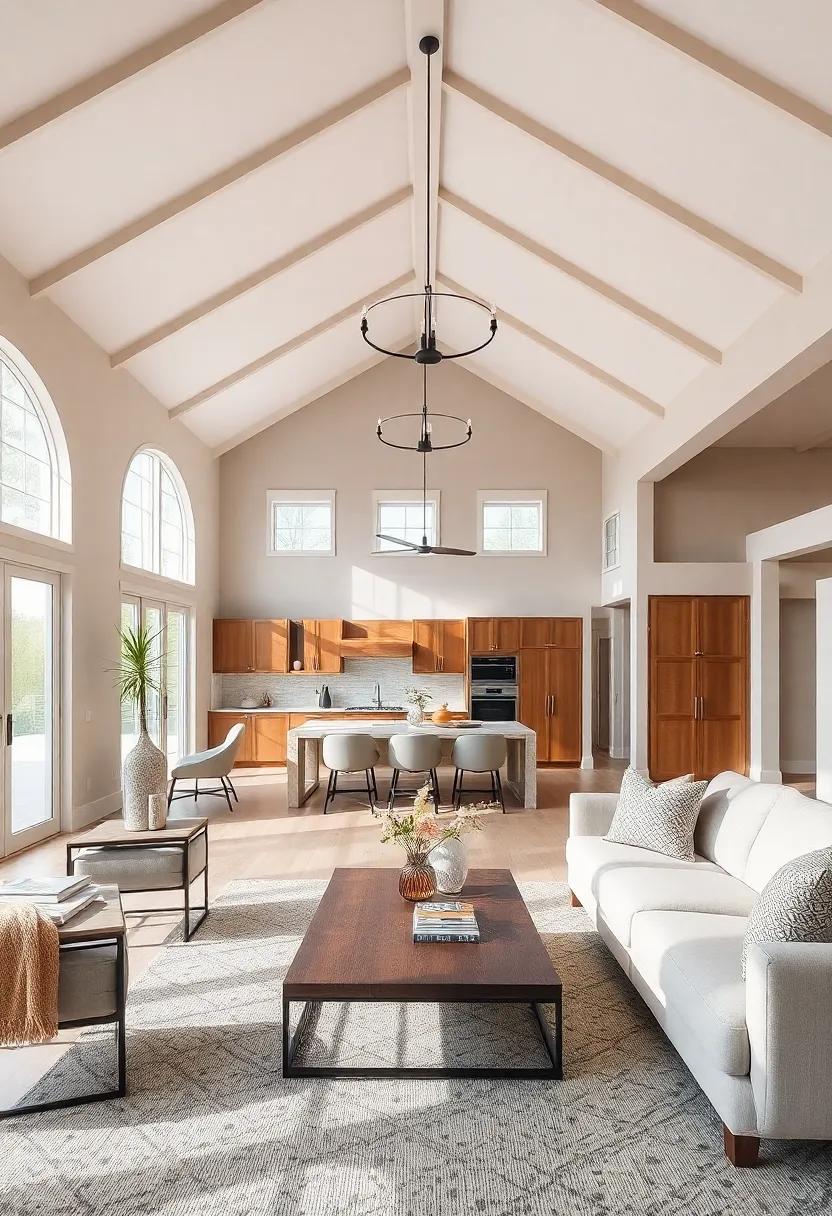
To craft a rich and inviting atmosphere in your open concept space, combining different textures is key. Incorporate soft textiles, such as:
- Plush throw pillows in varying patterns and fabrics
- Layered area rugs that add depth—consider mixing woven jute with a shaggy texture
- Curtains in a sheer fabric to allow natural light while adding softness
Moreover, enhancing structural elements with unique finishes will create visual interest. Think about using:
- Wood accents on beams or ceilings to warm up the space
- Metallic fixtures like brass or copper for an elegant touch
- Textured wall finishes such as reclaimed wood or exposed brick to evoke a rustic charm
Neutral base with Pops of Color: Maintain a neutral foundation for large elements and introduce vibrant colors in accessories for an inviting feel
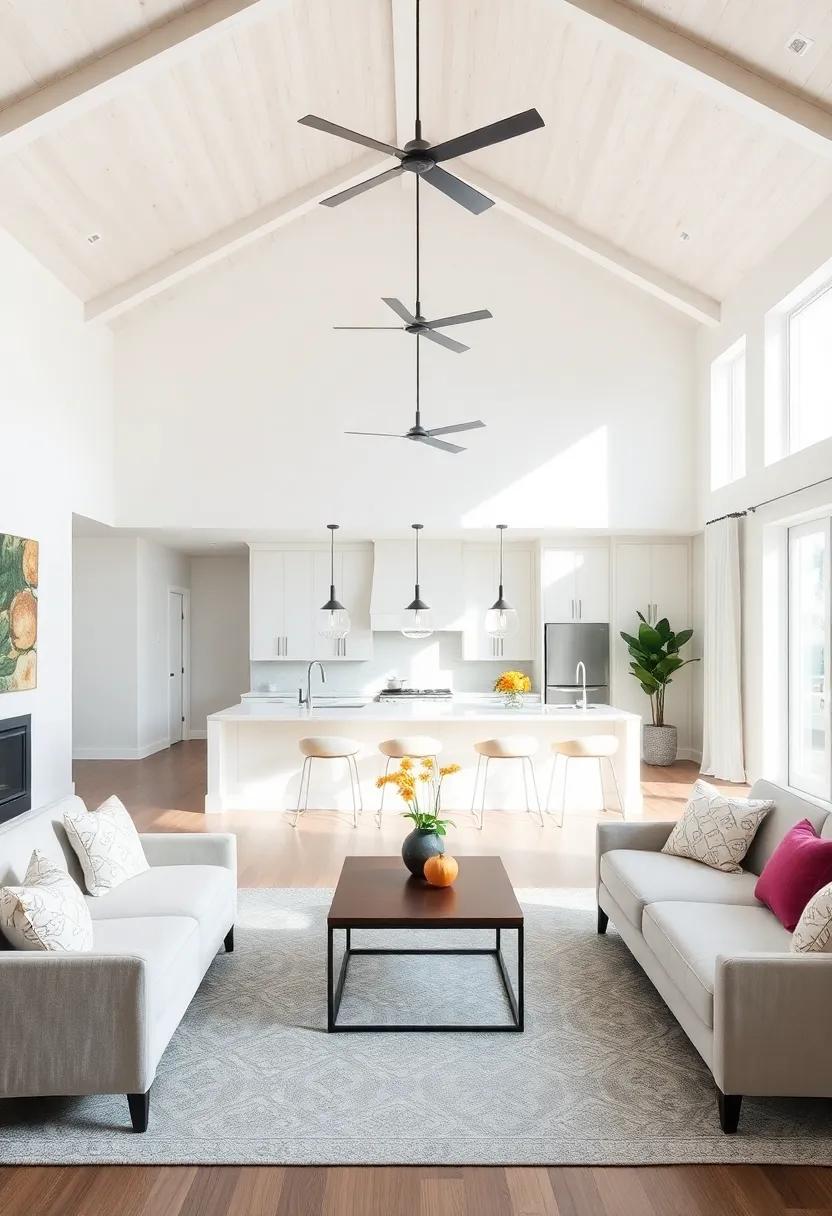
Creating a visually appealing space in your open concept living room and kitchen begins with a solid neutral base. Choosing a soft palette of whites, creams, and grays for your walls and large furniture pieces sets the perfect backdrop, establishing a serene atmosphere. To enhance this calm environment, consider incorporating warm textures with materials like natural wood and soft fabrics, which add depth and tactile interest.This foundation allows you to play with bold colors and patterns, bringing energy and personality into your space without overwhelming it.
Accessorizing with vibrant hues is where the magic happens. Think of introducing pops of color through varied elements such as:
- Cushions: Use bright throw pillows in jewel tones or playful patterns on your neutral sofa.
- Artwork: Bright paintings or colorful prints can serve as focal points that draw the eye and spark conversation.
- Rugs: A bold area rug can anchor the space while providing a splash of color underfoot.
- Kitchenware: Vibrant dishware and utensils can peek from open shelves, marrying functionality with flair.
Additionally, consider creating a visual balance by using a structured color scheme throughout your accessories. This can be elegantly presented in a simple table:
| Color | Accessory Example | placement |
|---|---|---|
| Teal | Cushions | Sofa |
| coral | Artwork | Wall |
| Mustard | Rug | Under Coffee Table |
| Bright Yellow | Kitchenware | Open Shelving |
Plan for Efficient Flow: ensure pathways between the kitchen and living room are open and unobstructed for easy navigation in daily living
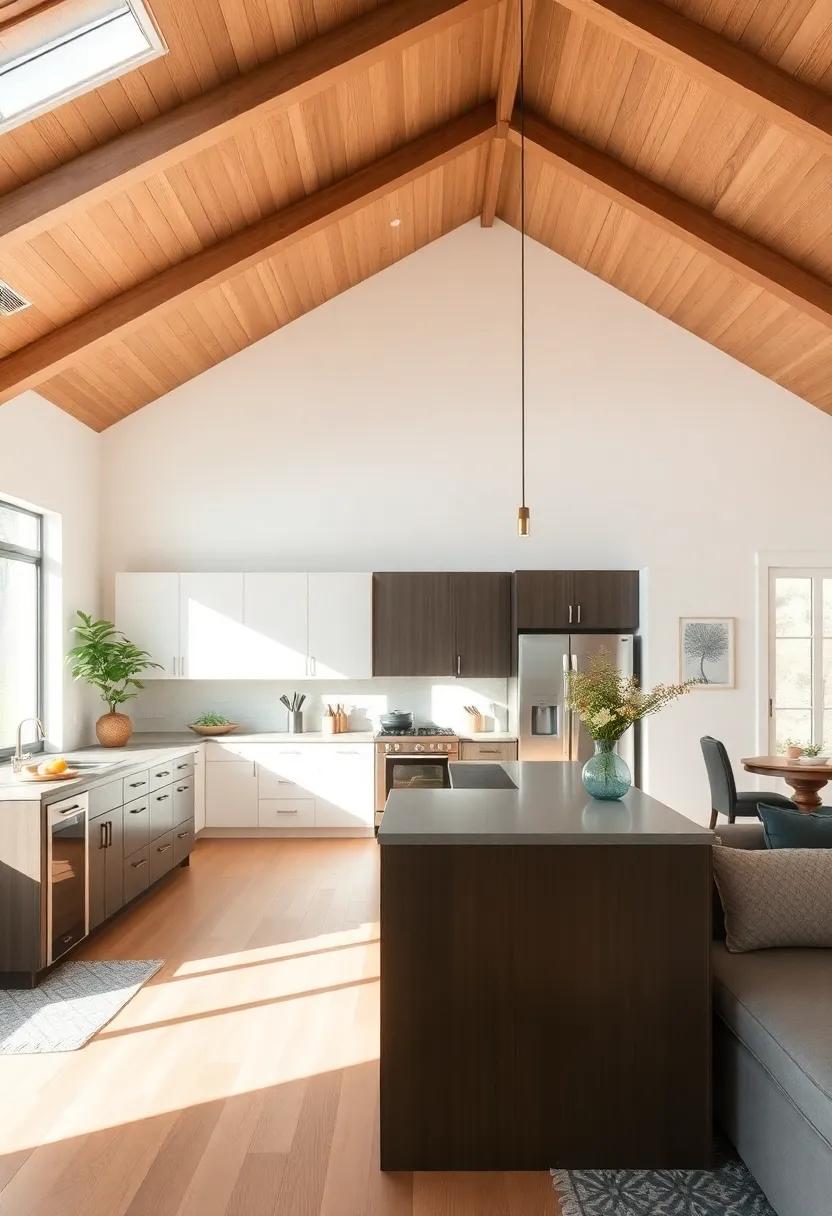
To create a harmonious blend between your kitchen and living room while ensuring seamless navigation, it’s essential to maintain open pathways that facilitate movement. Consider the following tips for optimizing your layout:
- Strategic furniture placement: Arrange seating and tables in a way that they don’t impede traffic. For instance, place sofas and chairs away from walkways to allow guests and family members easy access to the kitchen or dining area.
- Visual Boundaries: Use area rugs or different flooring materials to delineate spaces without blocking pathways. This method helps define each area while keeping the flow uninterrupted.
- Built-in Storage Solutions: Maximize space by incorporating shelves and cabinets that are designed to blend into the walls, keeping floors clear and making movement feel natural.
Additionally, consider incorporating design elements that not only enhance aesthetics but also encourage a free-flowing environment:
| Design Element | Functionality |
|---|---|
| Open Shelving | Creates an airy feel while providing easy access to kitchen essentials. |
| Sliding Glass Doors | Connects spaces visually and physically, allowing light to flow and providing unobstructed views. |
| Central Islands | Serves as a natural divider while promoting interaction between the kitchen and living room. |
Wrapping Up
As we wrap up our journey through these 25 inspiring ideas for transforming your open concept living room and kitchen with vaulted ceilings, we hope you’ve found the perfect spark to ignite your creativity. The blend of space and light that vaulted ceilings offer can elevate not just the design, but the entire atmosphere of your home. Whether you’re drawn to cozy nooks or vibrant social hubs, the possibilities are limitless.
Remember, each idea can be tailored to reflect your personal style, making your open concept space truly your own. Embrace the beauty of openness while ensuring functionality meets aesthetics. Happy decorating, and may your living space become a sanctuary that reflects your essence and invites connection!

